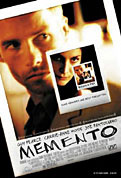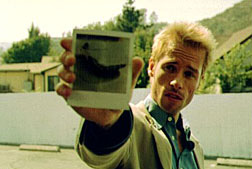News
Books
Writing
Hobbies
Gallery
Links
Email Brian
Email Kerri
Unless otherwise noted,
all material on Heromaker.net
is written by Brian Murphy
© 2006.
Review Archive
FILMS
 Memento (2000)
Memento (2000)I'm not going to lie. I'm not going to hold back. I'll give it to you straight. Memento is one of the best movies I've ever seen. That's right—take all movies ever filmed (or unfilmed!) and pour them into a big vat and I've found that Memento is one of the ones that rise to the top. This film is tight, original, and all-around jaw-droppingly fantastic.
(Fair Spoiler Warning: I'm serious about this warning. If you haven't seen this movie, please stop reading now. You'll do yourself a huge favor by knowing nothing about this film before seeing it. You'll thank me some day.)
Memento is a simple story told in a very complex and confusing way. Leonard (Pearce) was involved in an accident. Exactly how long ago this accident took place, the audience never finds out because Leonard has lost his ability to form new memories. He knows everything about himself and his life up to the moment of the accident, and that his wife was killed in the accident, but after that—bam, no short-term memory. This, in and of itself, is a tad problematic in that, how is he aware of his condition if he was told about it after the accident. It's a small, tiny, nit-pick that can be easily overlooked because the rest of the film is just that good.

Memento is shown backwards. We see how the story ends in the very first scene. But it makes no sense. We don't know who these characters are, or how they relate, or what the significance of anything they're talking about. Slowly, as we travel back in time, scene by scene, we understand what the previous scene meant. This is a genius maneuver on director Nolan's part. He's using the medium itself and the backwards chronology to help the audience feel how Leonard feels. Confused. Lost. Unsure who is a friend and who is an enemy, unsure who to trust.
This film raises some wonderful philosophical points. There's that old saying that says "time heals all wounds." And it's true. A year after someone dies, you feel better. Ten years pass and you've probably gone on with your life. You may still miss them, but for all intents and purposes you're OK. But what happens to someone like Leonard who can't feel time? He can't judge how long ago something happened. How does he get over his wife's murder? He wakes up every morning and her side of the bed is empty and he just assumes that she's gone to the bathroom. A great line from the film: "I can't remember to forget her." Incredibly powerful, these questions.
Leonard is tracking down "John G.", the man who killed his wife. A voice-over narration is employed in this film, implying to the audience that Leonard's telling us this story—but his memory is broken and thus he becomes an unreliable narrator. He's not purposely deceiving us any more than he's purposely deceiving himself. He just can't help it.
(Serious Spoiler Warning: I'm not kidding. If you keep reading, this movie will be ruined for you. Consider yourself warned.)
The ending of this flick is not unlike The Sixth Sense or Donnie Darko. Call it a twist or a surprise or a gimmick or whatever. The fact of the matter is: It rocks. Walking out of the theater all I could say was, "Wow. Just...wow."

I recently saw Memento again, but this time on DVD. My friend, with whom I watched it, pointed out that up until the last minute, Leonard was an incredibly sympathetic character. People abuse his condition and take advantage of him which makes him likable and sympathetic. But then, in the final scene, he loses some of the audience's emotional attachment.
He may not know who he is or what he's done, but in the last minute he decides what he's going to be: a murderer guilt-free of murder. In this final scene, he abuses and takes advantage of his own condition for a little payback. Even though he sets himself up to be a murderer—I feel bad for him. It probably isn't the right feeling to have, but I have it nonetheless. How frustrating would it be to live Leonard's life? Earlier in the film Leonard says, "He took away my ability to live," of the man who damaged his brain. That's almost worse than dying. It's pure torture. At one point or another I'm sure we've all forgotten where we've parked the car. Imagine that feeling for a moment. That utter confusion. Now, expand that to everything in your life, all the time. Although I may not condone Leonard murdering Teddy—I sure can sympathize with why he did it.
There are wonderful details to this film. The items and routine Leonard has to employ to make his life possible are intriguing. A Polaroid camera, tattoos, pens and notepads and maps. Memento almost makes the condition seem cool—until I realized that it'd be fun for exactly five minutes, then I'd like my short-term memory back, thankyouverymuch!
I recommend this movie to children of all ages. (Well, not the wee ones—Memento ain't for the kiddies.) It is the Must-See of all Must-Sees! And now I'm very interested in reading the source material, Memento Mori, written by the director's brother, Jonathan Nolan.
|
|
